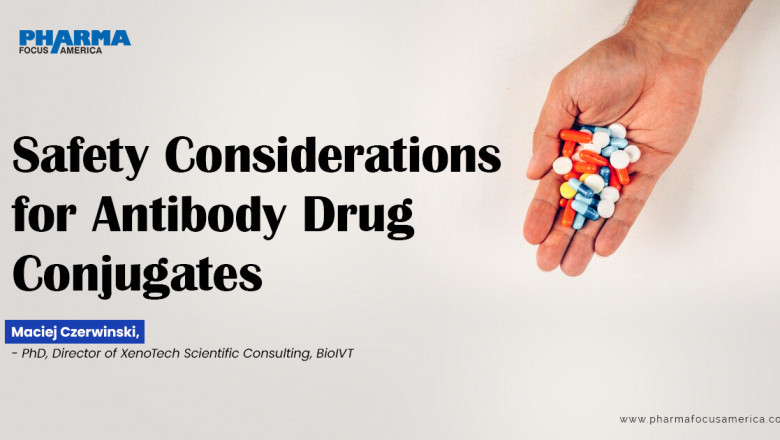views
Antibody Drug Conjugates (ADCs) are an innovative and evolving modality targeting cancer cell populations with highly toxic chemotherapeutics. An overview of the state of the field from the perspective of drug safety is followed by a discussion of FDA-approved ADCs for oncology patients, and in vitro evaluation of ADC drug-drug interaction (DDI) potential. Cases of DDI involving ADC are presented. Best practices for an in vitro safety evaluation of the ADC, which are based on the FDA guidance document, are discussed.

Current state
Antibody drug conjugates (ADCs) are innovative modalities to deliver chemotherapeutics to specifically targeted populations of cancer cells. The first ADC approved by the United States Food and Drug Administration (FDA) in 2000 was gemtuzumab ozogamicin, developed by Celltech and Wyeth for treatment of patients with acute myeloid leukemia (AML). Currently, there are 12 FDA-approved ADCs on the US market for treatment of hematologic and solid tumors (Table 1). The basic purpose of this novel modality is to increase the efficacy of anti-neoplastic therapies and to reduce their toxic side effects. Toxicity of chemotherapy often prevents dosing drugs to an effective level or leads to a reduction in drug dose or cessation of a treatment. ADCs aim to deliver chemotherapeutics at an effective level combined with the elimination or reduction of dose-limiting toxicity.
Typically, ADCs comprise a monoclonal antibody (mAb), a payload molecule (e.g., “a small molecule") chemotherapeutic and a linker between the two (Figure 1). The mAb guides the drug to the population of tumor cells expressing a unique, targeted epitope absent on the surface of healthy cells. This combination of specificity of the mAb and the tumor marker provides a mechanism for reduction of off-target toxic effects of the chemotherapy and allows an increase of the drug efficacy. The linker stably attaches the payload to the mAb without affecting the mAb's ability to bind to its target and allows the payload to be released from the ADC upon reaching the intended cancerous cell. Mechanisms by which payload molecules can kill tumor cells include DNA cleavage and cross-linking (calicheamicin, pyrrolobenzodiazepine dimer), microtubule inhibition (auristatin, maleimidocaproyl monomethyl F, maytansine, maytansinoid DM4), topoisomerase inhibition (Deruxtecan, SN-38) and induction of apoptosis (Pseudomonas exotoxin A). Table 1 lists malignancies targeted by ADCs currently in the clinic. Patient populations presenting with advanced or metastatic tumors that were not responsive to one or more of the conventional chemotherapies often receive ADC therapies.
The potential toxicity of the ADC therapies is a recognized concern. Nine out of 12 ADCs on the market carry a boxed warning. Boxed warnings, formerly known as Black Box Warnings, are the highest safety warnings that the FDA assigns to medications. The toxicities observed in clinical trials can vary among ADCs carrying the same payload. Four ADCs utilize auristatin E as a chemotherapeutic agent: brentuximab vedotin, tisotumab vedotin, polatuzumab vedotin and enfortumab vedotin (Figure 2, Table 1). Only the former two required boxed warnings: brentuximab vedotin for progressive multifocal leukoencephalopathy in Hodgkin’s lymphoma, systemic anaplastic large cell lymphoma and HER2-positive, metastatic breast cancer patients; and tisotumab vedotin for changes in the corneal epithelium and conjunctiva resulting in changes in vision, including severe vision loss, and corneal ulceration in patients with recurrent or metastatic cervical cancer.

Read more: https://www.pharmafocusamerica.com/research-development/safety-considerations-antibody






















Comments
0 comment